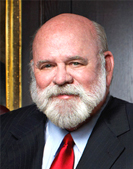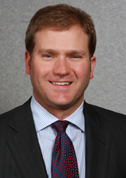© 2015 The Texas Lawbook.
By Natalie Posgate
(Aug. 21) – Frank Branson and Michael K. Hurst sure deserve the weekend.
Earlier this week, their law firms took home a Texas-sized win when a West Texas jury determined that a group of business partners conspired to cut their clients out of a lucrative mineral rights leasing deal – and their clients should get around $71 million in damages collectively because of it.
The verdict, which came after three-and-a-half weeks in the courtroom, is believed to be the largest ever not only in Fisher County alone, where the lawsuit was filed, but also across the three counties the 32nd Judicial District Court serves, which also includes Nolan and Mitchell counties.

“[The jury] wanted to send a message that this kind of conduct shouldn’t be allowed to happen in Fisher County,” said Branson, who represented Dallas-based Tiburon Land and Cattle, LP and Trek Resources, Inc. “Our clients did what they had to do to protect their rights and get their money back.”
Hurst and law partner Jonathan Childers said the verdict was a pure redemption for their clients, who later joined the lawsuit as intervenor plaintiffs, because it was not the typical business-deal-gone-wrong: it was a betrayal by a best friend and a lawyer who had previously provided loyal representation.

“This is a quintessential story of a deal with a lawyer and a friend gone badly,” said Childers, who, with Hurst, represented L.W. Hunt Resources and Richard Raughton.
“We asked the jurors to send a message that you can have trust and respect for lawyers… and being a lawyer means being in a very noble profession,” said Hurst, a named partner at Gruber Hurst Elrod Johansen Hail Shank in Dallas.
“Listening to some of the things done in case, it would be very easy for the jury to walk out of the courtroom and say, ‘How could I ever trust or respect a lawyer ever again?’ ” he added. “We were there to send that message and hold all lawyers accountable.”

Attorneys for the defendants either declined to comment or could not be reached by The Texas Lawbook.
The primary defendants, Chester Carroll and Kerwin Stephens, countersued, and contended at trial that they did nothing wrong and that the plaintiffs did not carry their weight in the partnership. The jury denied their counterclaims.
In addition to Hurst and Childers, the trial team for Hunt and Raughton included Gruber Hurst associate Christina Mullen, Grapevine attorney Jordyn J. Christian-Gingras of the Beckmen Law Firm (who initially filed the suit) and local counsel Michael Hall of the Hall Law Firm in Sweetwater. Jason Bloom served as the team’s jury consultant. Dallas attorney Randy Johnston testified for the team as an expert witness on attorney professionalism and how Stephens, the attorney defendant, should have treated Raughton and Hunt as clients.
Branson tried the case for Tiburon and Trek with law partner Eric Stahl. Debbie Dudley Branson, who also practices at the Branson firm, worked on the team as their jury consultant.
“We had defendants who thought they could get away with something in which the money was so great that it tempted them into doing things they should not have done,” Stahl said. “Using the legal process, we were able to uncover the acts that convinced the jury that they had taken an opportunity for themselves that they were supposed to share with their partners.”
The Alpine Group
The story begins mid-2011, when Raughton, who has a geology background, approached Carroll, a friend since high school, about a business opportunity that Raughton had identified in Fisher County to obtain oil and gas leases from landowners and resell the assets to oil and gas exploration companies for a profit, court documents say.
Raughton also approached Stephens, his lawyer, to gauge interest on evaluating legal issues that would be involved with the prospect. Stephens agreed and also expressed interest in participating in the deal.
In October 2011, Raughton, Carroll, Stephens and Lowry Hunt – another longtime friend of Raughton’s and soon-to-be extended family since their son and daughter were engaged – formed the Alpine Group via their associated business entities to pursue the deal, according to court documents.
Each party contributed $125,000 and agreed to split the profits equally four ways, Hurst and Childers said.
The members quickly realized that they could acquire more leases but did not have enough funds, so they brought in Abilene oilman Tommy Taylor to join the partnership and round up a group of investors to raise capital, according to court documents.
Due to the significant capital Taylor’s group was anticipated to bring to the table, the partnership agreed that Taylor’s group would receive 82 percent of the profits and the Alpine Group would receive 18 percent.
Of the 82 percent, Taylor was to receive 18 percent of the profits and the other parties, which included Branson’s clients Tiburon and Trek, would receive 8 percent each, court documents say.
In January 2012, Taylor, Carroll and Stephens secretly formed “Group II” in order to reap more profits for themselves, the plaintiffs argued at trial. A couple months later, Stephens falsely represented to Hunt and Raughton that he would no longer participate in the deal because it was not doing as well as projected, according to Hunt and Raughton’s fourth amended petition in intervention.
Stephens and Carroll convinced Hunt and Raughton to reduce their stake in the Alpine Group, misrepresenting that Carroll would also dilute his shares. But secretly, Stephens’ and Carroll’s interests were increased to 66 percent collectively.
Meanwhile, through Taylor, Group II was striking a deal with Oklahoma E&P giant Devon Energy. Group II sold 13,000 additional acres to Devon for more than $10 million, according to court documents.
But Hunt and Raughton did not know about the Devon deal or the formation of Group II until after Branson’s team subpoenaed them for their lawsuit in mid-2013.
The Investors
Branson’s clients initiated the litigation in January 2013, claiming Taylor, Carroll and Stephens breached their duties to Tiburon, Trek and the other investors by giving themselves credit for financial contributions they never made to fund the lease acquisitions and by pocketing valuable investments that they should have shared with the other participants of the Three Finger/Black Shale Prospect Partnership, the seventh amended complaint says.
The lawsuit, filed against the three partners, Stephens’ law firm and the companies the partners founded or affiliated with for the partnership, alleged that all investors besides Stephens, Taylor and Carroll were purposely left out of the 13,000 acreage deal with Devon and a 2,500 acreage deal with Eagle Energy, only receiving the opportunity to participate in the first 30,000 acres of oil and gas leases.
It also alleged that Taylor, Stephens and Carroll hardly used any of their own money for the $2.95 million they claimed to put toward the $7 million funding cost of the partnership. In fact, most of that $2.95 million came from the $2.25 million in earnest money that Devon paid for their acreage acquisition, the petition says.
Stahl said that in regard to Tiburon and Trek’s claims, Stephens’ and Carroll’s lawyers spent most of trial using the defense that they did not know the outside investors or what they had agreed to with Taylor, so they could not have conspired against the other parties.
Taylor could not defend himself at trial because he unexpectedly passed away last year in a plane crash. Fort Worth attorneys from Jackson Walker represented his estate in the litigation, but the team, which included William Jenkins, Jay Wieser, Albon Head and Amanda Bush, reached a settlement agreement with the two groups of plaintiffs before trial.
Stahl said his team effectively disproved Carroll and Stephens’ argument by showing e-mail correspondence exclusively between Stephens, Carroll and Taylor in which they discussed conspiring against the other investors to pocket more profits for themselves.
Stephens and Carroll spent more of their efforts fighting Hunt’s and Raughton’s allegations. They countersued, claiming Raughton and Hunt did not fulfill their contractual obligations when they all entered the Alpine Group.
In one reply brief filed by Carroll, he alleged that “despite the failure of Hunt Resources (through the inactions of Lowry Hunt) and Arapaho (through the inactions of Richard Raughton) to honor their contractual obligations,” he, Stephens and Taylor “sold over 42,000 clear-title leasehold acres to Devon Energy Production.
“As such, Thunderbird (Stephens’ company) and Carroll had to perform a significant amount of additional work, effectively doubling the contemplated and expected workload by performing additional landman services, title work and field work counter-defendants failed to do,” the court document says.
One brief filed by Thunderbird contended that after the 30,000 acres involved with the Alpine Group partnership were sold, Hunt and Raughton “by written signature … expressly provided ‘a full and complete release and discharge of any and all claims pertaining to this project’ and acknowledged ‘there will be no more money paid in connection with this project and it is concluded.’ ”
Stephens’ lawyers were James Holmes and Andrea Seldowitz of Holmes PLLC in Dallas. Amarillo attorneys Thomas Riney and W. Heath Hendricks of Riney & Mayfield represented Stephens & Myers, the Graham, Texas law firm that Stephen practices at.
Abilene attorney Robert Wagstaff of McMahon Surovik Suttle represented Carroll.
After a six and one-half hour deliberation on Wednesday, the jury awarded Tiburon and Trek $43.1 million in damages, including $24 million in actual damages and $19 million in exemplary damages.
Jurors awarded Hunt and Raughton $3 million in actual damages, more than $7 million in disgorgement and $18 million in punitive damages.
“This hard-working jury got it right, and they deserve applause for their service,” said jury consultant Bloom, who has also worked on the prevailing side of other big trials such as Hunt v. Honeywell and ETP v. Enterprise. “At the end of the day, Michael Hurst and his team were very strategic in focusing the jury on all the betrayal and greed involved. Juries just can’t give defendants a pass on that kind of conduct.”

Stahl said the seven-woman, five-man jury was a mix of different people, including ranchers, farmers and housewives. Being in the small town of Sweetwater, Texas, he said many of the jurors already knew and trusted each other, which he believed made their deliberation process go smoothly.
“Out of the 53 questions, there was one subpart to one question that was not unanimous,” Stahl said, “but at the end of the day, it was inconsequential” to the verdict.
© 2014 The Texas Lawbook. Content of The Texas Lawbook is controlled and protected by specific licensing agreements with our subscribers and under federal copyright laws. Any distribution of this content without the consent of The Texas Lawbook is prohibited.
If you see any inaccuracy in any article in The Texas Lawbook, please contact us. Our goal is content that is 100% true and accurate. Thank you.
